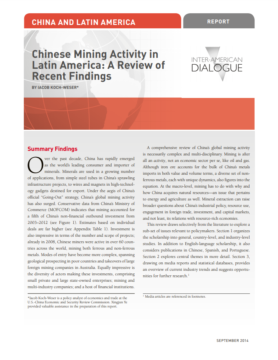The Politics Of Disaster Relief
After a 7.0 magnitude earthquake struck Haiti, the aftershock reached China in ways that few anticipated.The earthquake forced Chinese leaders to navigate the tricky politics of disaster relief.
On December 9, the Inter-American Dialogue hosted the online event Chinese Investment in LAC: Post-Pandemic Prospects, featuring remarks from Xingjian Zhao, head of the Diaz Reus China practice; Claudia Trevisan, executive director of the China-Brazil Business Council; Mayer Brown Partner Jose Valera; and Evan Ellis, research professor at the US Army War College Strategic Studies Institute. The discussion was moderated by Margaret Myers, director of the Asia and Latin America program at the Dialogue.
The panelists all alluded to considerable prospects for continued Chinese engagement with the Latin American and Caribbean (LAC) region in the coming months and years. These are difficult times for LAC, as well as for the Chinese economy, but this is also a moment when Brazilian assets are relatively cheap, as Trevisan explained. Brazil’s currency has depreciated by more than 40 percent this year. Valera suggested that Covid-19 will amount to “a small speed bump” for China “in the larger scheme of things,” noting a continued interest among Chinese companies in resource-seeking and market-seeking activity in LAC.
Panelists predicted Chinese involvement in numerous LAC sectors. Valera saw “a continuation of investments in both hydrocarbons and electricity,” for example, noting China’s interest not just in accessing natural resources but also learning about cutting-edge shale and deep water drilling processes and technologies. In Brazil, as Trevisan mentioned, the government will hold a number of auctions for public works projects over the next few years. China is expected to be interested in at least some of those opportunities.
Panelists also noted the likelihood of continued high-tech investment across much of the region, whether in telecommunications or other sectors, including electricity transmission and renewable energy. Trevisan mentioned the ongoing debate in Brazil about Huawei’s involvement in Brazil’s 5G network, noting that a possibly contentious Biden-Bolsonaro relationship might “change Bolsonaro’s calculus toward China.”
Zhao also indicated untapped opportunity in LAC for Chinese tech companies. China’s emphasis on the Health Silk Road will lead to investment in a range of sectors, including e-commerce, logistics, transport infrastructure, and even small-scale lending, he said. Interest in the LAC region may also grow as Chinese tech and other companies are restricted from operating in some advanced economies.
Chinese companies may very well encounter higher levels risk when investing in LAC post-Covid-19, as Ellis indicated, but also have certain advantages. Some of China’s recent acquisitions, including China Communications Construction Company’s purchase of a 30 percent stake in Portuguese firm Mota Engil, will help the Chinese companies to compete more effectively in public tenders across the region, he suggested. In addition, China’s economy is expected to grow by around 8 percent in 2021, which according to Ellis will make “Chinese demand and the leverage that comes with Chinese demand that much more important.”
Zhao nevertheless noted that the threat of US sanctions still looms large for Chinese companies as they consider new opportunities in the region. There is substantial overlap between the Chinese entities facing US sanctions and those doing business in the LAC region. Chinese companies might adopt a “wait and see attitude” as they assess Biden’s position on Chinese overseas engagement. In addition, Zhao mentioned that many countries in the region will be unable to provide the sort of sovereign guarantees that have tended to back China’s larger-scale projects. This may very well put downward pressure on future Chinese investment.
After a 7.0 magnitude earthquake struck Haiti, the aftershock reached China in ways that few anticipated.The earthquake forced Chinese leaders to navigate the tricky politics of disaster relief.
Despite reports in recent months that Mexican manufacturing is experiencing a resurgence, Mexico’s industrial sector faces tremendous challenges.
China has rapidly emerged as the world’s leading consumer and importer of minerals.
 Main Photo: Presidency of Argentina / Wikimedia Commons / CC-BY-SA-2.0
Main Photo: Presidency of Argentina / Wikimedia Commons / CC-BY-SA-2.0
